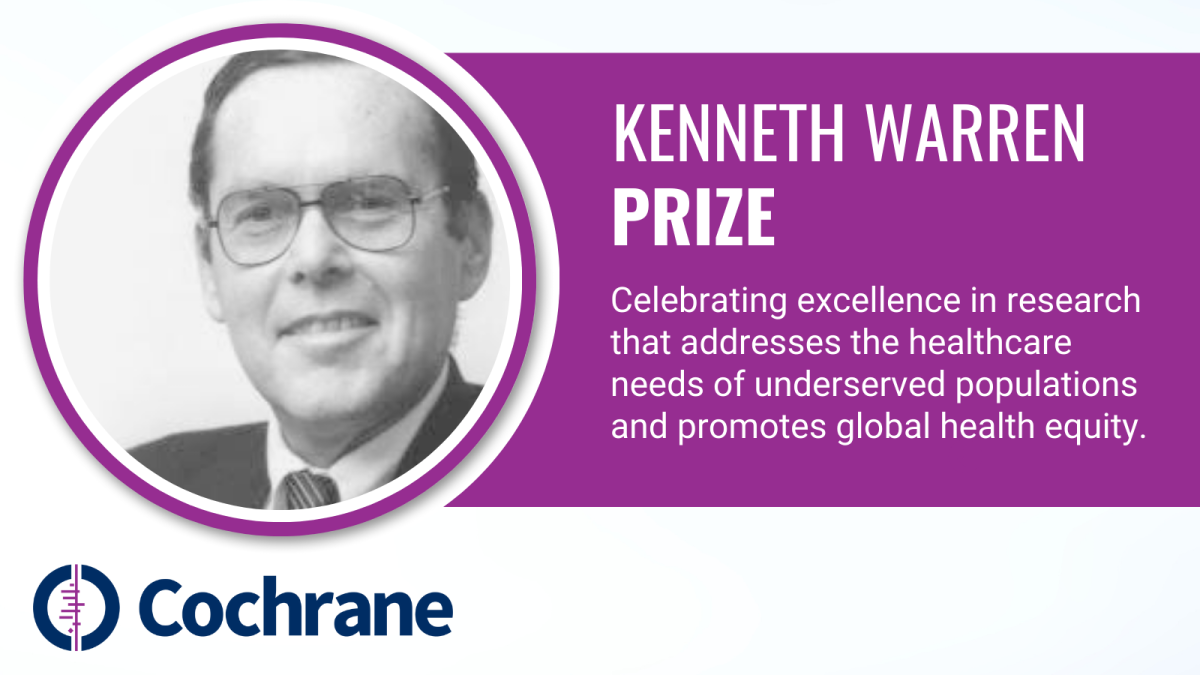
Every year Cochrane recognizes the outstanding work of Kenneth Warren, a scientist, extremely influential in drawing attention to the 'great neglected diseases' that plague people in developing countries. He prioritized the need for valid summaries of key research studies and to the way electronic media could be used to disseminate results of health research.
Kenneth was an enthusiastic supporter of the pilot work in pregnancy and childbirth that led to the creation of The Cochrane Collaboration, and, with Fred Mosteller, he co-organized the meeting at the New York Academy of Sciences at which the vision for Cochrane was first made public.

The Kenneth Warren Prize is awarded every year by Cochrane to a scientist who publishes a Cochrane Review about a health issue in developing countries. The winning entry judged to be both of high methodological quality and relevant to health problems in low-income countries.
The 2024 Kenneth Warren Award goes to Shaun Lee, for "Interventions for people with type 2 diabetes mellitus fasting during Ramadan"

We asked Shaun about his thoughts on the significance of this prestigious recognition.
Can you tell us briefly about your involvement in Cochrane?
I first got involved with Cochrane after being introduced by one of my co-author, who also happens to be a Kenneth Warren prize recipient. At that time, I was helping out as a translator for Cochrane Malaysia before being an editor for Cochrane Malaysia translation initiative. It was during this that I noticed there were many gaps in health related literature especially if these were to be applied in a low-middle income setting, where resources are limited.
What does this award mean to you personally?
The award is especially meaningful to me as this speaks of the importance of generating context specific evidence for low-resource settings. This represents a milestone in my career as a research scientist. It is a recognition of my passion for evidence-based medicine and my commitment to advancing the field through rigorous research. It is also a reminder that our work is not just about publishing papers or presenting at conferences, but about making a meaningful impact on healthcare outcomes. I am grateful to have had the opportunity to work with a talented and dedicated team of researchers, clinicians, and policymakers who share my passion for evidence-based medicine.
Can you tell us a bit about your winning Cochrane review and its relevance and impact on health issues in low-income countries?
Our review was a summary of evidence that evaluated the effects of pharmacological and behavioral interventions on individuals with type 2 diabetes (T2DM) who fast during Ramadan. The review found that while some interventions, such as DPP-4 inhibitors, SGLT-2 inhibitors, and GLP-1 analogues, may reduce hypoglycaemia, the evidence is generally low to very low, highlighting the need for further research on behavioral interventions, such as Ramadan-focused patient education, and telemedicine, which may be more accessible and cost-effective in low-income countries. With nearly one quarter of the population professing the Muslim faith, most of which live in low-middle income countries, these findings can have significant implications for healthcare providers and policymakers, who may need to consider alternative interventions and strategies to support individuals with T2DM who fast during Ramadan.
Finally, how important is this prize, its heritage, and prestige in promoting Cochrane and evidence-based health care?
The Kenneth Warren Prize plays a vital role in promoting Cochrane and evidence-based healthcare by recognizing excellence, upholding a legacy of rigorous research, increasing visibility, inspiring researchers, and advocating for the use of evidence-based practices in healthcare decision-making. It serves as a valuable tool in advancing the mission of Cochrane Collaboration and similar organizations dedicated to improving healthcare outcomes through high-quality research and evidence in LMIC’s.

